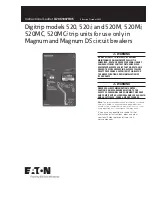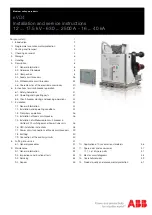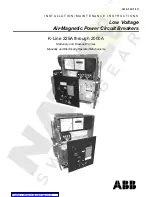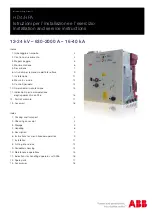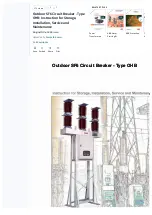
16
Interrupter/Operator Description
Closing and Opening Springs
The stored energy assembly consists of two dual closing
springs and a single opening spring.
Figure 19
shows the
three springs and their linkages to the charging devices. The
two closing springs are connected to crank arms mounted
on the rotating main cam shaft. The closing springs are
extended, and charged, by rotation of the crank arms
connected to the movable ends of the springs. The fixed
ends of these springs are attached to a support arm, which
in turn is bolted to the structure of the circuit breaker.
The opening spring is connected to the jack shaft. When the
circuit breaker closes, rotation of the jack shaft causes the
opening spring push rod to compress and charge the
opening spring. Consequently, the opening spring is auto-
matically charged whenever circuit breaker contacts are
closed.
Trip Free Operation
The GMI circuit breaker is mechanically and electrically trip
free. This important function enables the breaker to be
tripped before, after or during a closing operation.
Whenever the circuit breaker trip shaft is moved as the
result of manual or electrical signals or mechanical inter-
locks, a) a closed circuit breaker will open, b) a circuit
breaker in the process of closing will not complete the close
operation and will remain open, or c) an open circuit
breaker will not be able to be closed.
Damper
GMI circuit breakers are equipped with a sealed, oil-filled
viscous damper, or shock absorber (
Figures 19
and
19a
).
The purpose of this damper is to limit overtravel and
rebound of the vacuum interrupters’ movable contacts
during the conclusion of an opening operation. The damper
action affects only the end of an opening operation.
Two types of dampers are used on GMI circuit breakers,
depending on the vacuum interrupter family used. The
respective damper systems are as described in the following
sections.
Damper (used with all vacuum interrupters except type
VS-15050) (refer to Figures 19a and 37a)
The cylindrical body of the damper is secured to the circuit
breaker frame with a yoke. The damper’s piston and striker
tip protrude from the opposite end of this cylinder (the
lower end as installed on the circuit breaker). A striker block
is fixed within an outer tube, which is guided by the cylin-
drical body of the damper. The end of the outer tube is
attached to the circuit breaker jack shaft.
The outer tube and (inner) damper remain uncoupled until
the end of the opening operation is reached. At this time,
the tube’s striker block contacts the damper piston, to begin
control of the movable contact dynamics.
Figure 19a
and
19b
: Closing and Opening Springs, Spring
Charging Motor and Damper.
Figure 20:
Manual Charging
of the Closing Springs.
Figure 19a:
Damper (for
circuit breakers equipped
with type VS-15050
vacuum interrupter)
Note: Manual spring charging components will be
damaged by overcharging.
Manual charging action must be suspended when the
operator sees the “Charged” status indicator appear on
the front panel of the circuit breaker and hears the
sound of impact against the internal closing latch.































